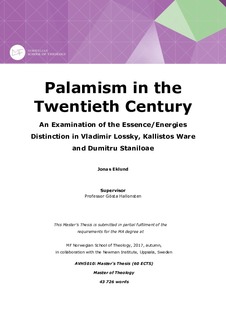| dc.description.abstract | This Master’s thesis will explicate, analyse and discuss the Orthodox doctrine of the essence/energies distinction in three prominent 20th century theologians, namely, Vladimir Lossky, Kallistos Ware and Dumitru Staniloae. This is urgent because of the central position this doctrine occupies in contemporary Orthodoxy, together with the lack of precision one usually encounters when references are made to this distinction.
Methodologically, it will proceed by a careful reading of primary sources in order to explicate and clarify, in each theologian, the most important lines of thought concerning the essence/energies distinction. It will also explicate details which may affect, elucidate, or even put into question, these major lines of thought. As secondary sources, other Orthodox theologians as well as Greek Church fathers will be consulted.
Lossky and Staniloae, respectively, present rather clear visions about the relationship between God’s essence and energies. As it turns out their positions are quite far from each other and, at some points, even incommensurable. Ware, on the other hand, affirms traditional and contemporary formulations, yet without providing any clear definition of his own opinion.
As regards God’s energies towards creation, the opinions of the three theologians are pretty close; but regarding God’s eternal energies, their differences become apparent. Lossky affirms an antinomic relationship between God’s essence and energies, according to which they are mutually exclusive yet virtually identical. The essence is completely void of activity, whereas all activities are contained by the energies. Thus, even the inter-trinitarian love is outside of the essence. Staniloae affirms, on the contrary, that God’s essence is identical to the divine persons and their communion of inter-trinitarian love, through which they give themselves to each other completely. Ware remains unclear about the precise character of his opinion, and it is virtually impossible to tell whether he would prefer Lossky’s or Staniloae’s solution. | nb_NO |
